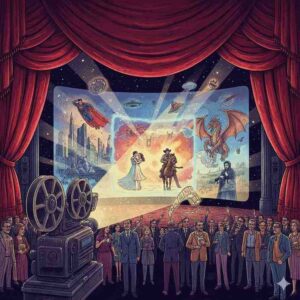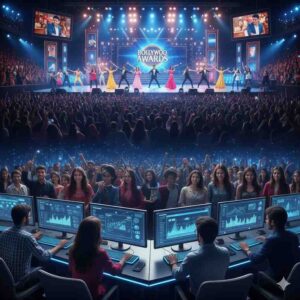Key Metrics (As of 2025):
• WGA’s 2023 agreement prohibits AI-written scripts from being considered original literary material
• Netflix allocated $18 billion to content development in 2025, including AI-based visual production tools (Source: Financial Times)
• Staircase Studios produces films under $500K with AI-enhanced visuals (Source: Variety)
• Apple, DreamWorks, and Amazon have partnered with OpenAI, Runway, and other startups for AI-led film pipeline integration (Source: Official Press Releases, 2024-25)
A New Creative Pipeline: Where Human Meets Machine
Artificial Intelligence has firmly embedded itself into the filmmaking process—not as a replacement for human creators, but as a tool to amplify storytelling and optimize production workflows. From pre-visualization to post-production, major studios and emerging creators alike are deploying AI to cut costs, save time, and explore new creative frontiers.
Netflix’s $18 billion annual content spend now includes AI-driven advancements in set design, character modeling, and visual continuity. Meanwhile, Amazon and Apple are actively integrating AI tools like Runway and Luma AI into their VFX and animation workflows, a move designed to streamline creative collaboration across continents.
WGA Safeguards the Writer’s Role
In a landmark agreement reached during the 2023 Hollywood writers’ strike, the Writers Guild of America (WGA) and the Alliance of Motion Picture and Television Producers (AMPTP) outlined firm boundaries for AI usage. According to the terms, AI-generated scripts cannot replace human-written material or be considered original literary content.
Studios can still use AI for brainstorming, translation, or efficiency—provided a human remains the primary author. This agreement ensured that generative AI tools assist writers rather than compete with them, setting a global standard in the ethical use of AI in creative industries.
Independent Studios Go Fully Digital
While big studios use AI as an enhancement layer, smaller firms are going further. Staircase Studios, a Los Angeles-based independent company, now creates entire sci-fi features with minimal crews by leveraging AI for environments, character design, and lighting simulation. Their 2024 releaseGlare Horizoncost under $400,000 and was sold to multiple international distributors.
Similarly, the AI-centric Promise Studios, backed by Peter Chernin and Andreessen Horowitz, has begun piloting short films entirely scripted, storyboarded, and pre-visualized through generative AI systems, although final production still relies on human talent.
Ethics, Accuracy, and Authenticity
Concerns around misinformation, bias, and deepfakes remain central to the AI debate. To address this, studios are beginning to adopt transparency protocols. Disney and Warner Bros. have both announced internal review boards that evaluate AI-generated assets for accuracy, originality, and potential copyright conflicts. These initiatives aim to build industry trust while preserving intellectual property rights.
Conclusion: A Future Written by Many Hands
AI’s role in filmmaking is not to replace the creator but to multiply their capabilities. Whether through automated VFX tracking, virtual cinematography, or voice replication (with actor consent), studios are navigating this technological shift with a blend of optimism and caution.
As industry regulations mature and ethical norms solidify, AI will likely remain a collaborator—not a competitor—in the next chapter of global cinema.









